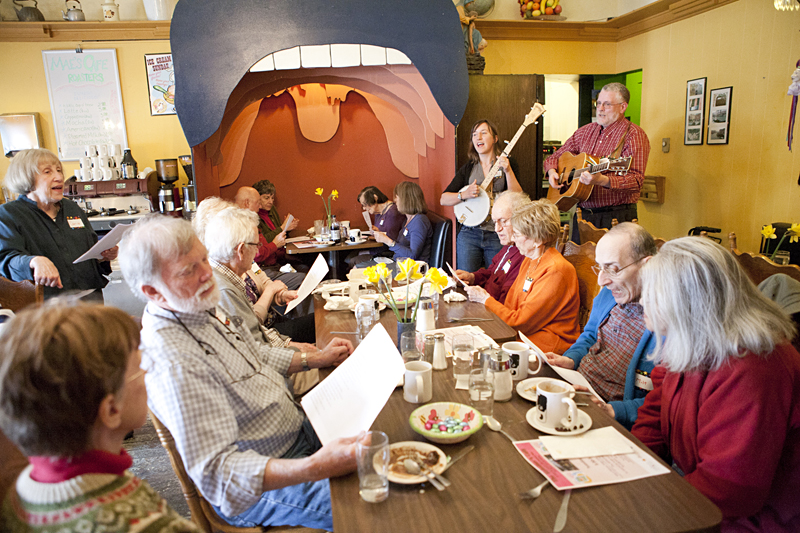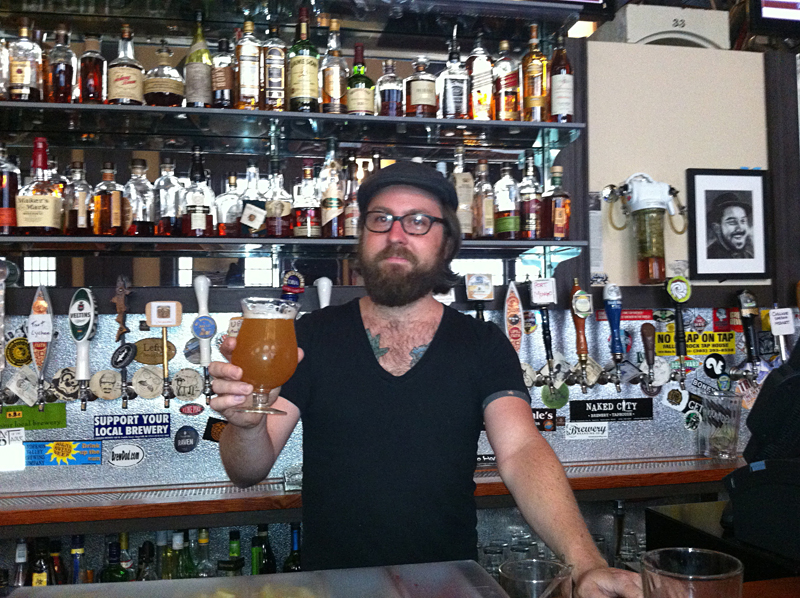With its signature antiques—some loosely dairy-themed, others simply random—Mae’s Phinney Ridge Cafe drips with nostalgia, its cluttered ambience inspiring a variety of memories customers can connect to. Thus, it’s perfect for a monthly Alzheimer’s cafe—an informal support group for people living with the disease and the loved ones who serve as their caretakers.
Every month, Inge Hesse brings her husband, Wolfgang, famous among the cafe’s regulars for his sweet tooth. Both are so comfortable at Mae’s, it’s hard to tell that Wolfgang is the one afflicted.
“It’s a friendly place,” she says. Wolfgang interrupts: “This place! It’s got the best ice cream!” She smiles. “He loves the vanilla, but he’ll often eat strawberry too.”
Mae’s normally closes at 2 p.m., but keeps its doors open on the second Tuesday of every month to host one of the nation’s first Alzheimer’s cafes. Marie Trainer, a Mae’s regular, got the idea to found one here while visiting family in England, where she was told about the many Alzheimer’s cafes throughout Europe, where the concept originated. (America’s first was in Santa Fe, N.M., in 2008, and subsequent cafes have formed in California, Colorado, and Florida.)
Trainer recounts the difficulties she faced when her husband, Leo, started to show signs of memory loss. “It became progressively difficult to be in social settings, when people would say, ‘Oh, the Seahawks lost last week,’ and he couldn’t remember that, and he couldn’t keep up with the conversation. He tended to get rather distressed when we were in those settings.”
A former pilot for TWA, Leo was diagnosed with Alzheimer’s three years ago. “At this point it’s slow,” Trainer says. “It’s not one of the fast-progressing diseases. But some days are better than others. The evenings are worse than the mornings. Some days you wouldn’t even know.”
She says the cafe has rejuvenated the couple’s social life. “It’s added something to look forward to. He smiles when he’s there. The number-one thing is you’re getting out and doing something positive. And this is the two of us doing something together.”
Almond-crusted coffee cake and fresh cherry pie are some of the treats that Mae’s owner Jeanne Barwick serves attendees. Transformed into a welcoming neighborhood joint in 1988, the venue was previously the faded Phinney Ridge Cafe, founded in 1920. An undeniably prominent member of the Phinney-Greenwood community, Barwick is also the self-described “sailor-mouthed” DJ at the Greenwood Senior Center’s oft-sold-out Karaoke Bingo Night.
“When they started talking about this cafe, the obvious person was me,” Barwick says. “People feel like they can kick back, and that’s the whole idea of an Alzheimer’s cafe: for people to feel comfortable in a public setting.”
With worn wood floors, rickety chairs, and dusty boxing gloves hanging from the ceiling, Mae’s offers an attractive, informal environment for first-timers. Volunteers from the Greenwood Senior Center bring a guitar and banjo to serenade the 10 or so couples present with “Let It Be” and “This Land Is Your Land.” Lyric sheets are passed out, and almost everyone sings along.
Ann Voorhies, a biopsychology professor at the University of Washington, believes Alzheimer’s cafes are a progressive way of treating the disease. “Social interaction is excellent for mental health overall . . . For someone with dementia, it will improve mood,” she says. “It’s not like it’s a magic bullet, but it’s certainly better than sitting at home alone and allowing the disease to progress sooner.”
Voorhies believes the cafes also greatly benefit those not suffering from Alzheimer’s, but who accompany someone who is. “Knowing other people who are going through the same thing: It’s certainly an important step for the care-givers’ mental health.”
Ralph Moser has been bringing his wife, Nancy, to Mae’s for several months now. He says the cafe is “an excuse to be social with other people in a non-structured setting. It’s nice to just be here, with other normal people.”
“Most of the people come in with a spouse, and others come in with their adult daughters,” says Carin Mack, a social worker for the Greenwood Senior Center. Having run the gathering for a little over a year, Mack is familiar with various types of Alzheimer’s support groups. She believes the cafe fills a niche, and expects others to pop up in neighboring communities soon.
Mack says they chose Mae’s in part because the restaurant closes to the public after lunch, giving the Alzheimer’s cafe group privacy. “We wanted a place that was cozy, and not somewhere sterile,” she says. “An upscale Seattle restaurant was not at all what we were looking for.”
Phil Stoa started bringing his sister, Martha, a bit before Christmas. “The food is good, it’s a change of pace, and it’s nice to be seeing the same folks here,” he says. “Every Tuesday afternoon, she and I will go somewhere, like a walk at a park, so this just seemed like a natural fit.”






